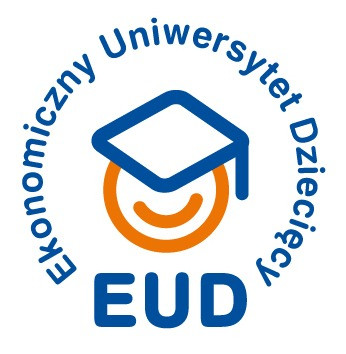Children’s University of Economics (EUD) is an all-Poland program of economic education, initiated and run by the Foundation for the Promotion and Accreditation of Economic Education in cooperation with local partners:
- Warsaw School of Economics (SGH) in Warsaw,
- Karol Adamiecki University of Economics in Katowice,
- University of Bialystok (UwB),
- Poznan University of Economics (EUP),
- School of Economics, Law and Medical Sciences (WSEPiNM),
- Wroclaw University of Economics (UEP),
- University of Information Technology and Management in Rzeszow.

The offer is addressed to children aged 11-13, pupils of the 5th and 6th grades of elementary schools. The University has been functioning since 1st April 2008. Participation is free of charge.
Assumptions of the Programme
- EUD is an edutainment event, which means that its basic assumption is to teach through entertainment.
- EUD operates under the semester system. Each semester, six interesting meetings on economics are organized (each meeting is devoted to one different theme of economics and management).
- The program is focused on issues of management, economics, marketing, economic history, psychology of business, ethics. The organizers do their best so that the level of difficulty of the lectures was adjusted to the age of participants and that the language was intelligible for them. Simplicity of the content is reinforced by different types of multimedia visualizations.
- The lectures are carried out by local partners’ academic lecturers, Fundation’s experts and external specialists.
- The meetings last 90 minutes. They are very interactive – they compose of a lecture and a group workshop. The final element, which summarizes the meeting is a public presentation of teamwork results with a lecturer’s commentary.
- Each EUD student has a student’s registration book. Every time participation in the meeting is confirmed by the registration in the book.
- Participation in 4 out of 6 meetings is required for graduation. Students who participate in all six meetings receive a diploma with distinction.
- At the end of each semester willing students take the final exam. The student who obtains the highest number of points receives a special distinction and a valuable prize – a notebook. In addition, students who obtain high results receive gifts.
- Parents are also invited to lectures, which were prepared according to their needs. The lectures concern issues such as conflicts solving, upbringing, shaping attitudes.
- After each meeting, educational materials, video report and photo gallery are published on the University’s website. The gallery contains not only photos of participants but also of their teamwork results.
The aims of Children’s University of Economics
- promoting entrepreneurial attitudes and behaviors among the youngest;
- developing the ability of independent thinking, making decisions, conscious planning and consistent realization of established targets and flexibility in acting;
- encouraging children to develop themselves, developing the ability of self-learning additional knowledge as well as of effective time management;
- shaping the ability of logic thinking, creative problem solving, effective communication, teamwork;
- developing the ability to transfer knowledge into practical skills;
- preparing the youngest for making right choices through the process of making them aware of the need of implementing ethics both into private life and work;
- promoting the economic education, encouraging the youngest to take closer interest in economc issues.
- Children’s University of Economics (In polish)
- the Foundation for the Promotion and Accreditation of Economic Education
Centre for Open Education
al. Niepodległości 162,
building G, room 150, 226,
02-554 Warszawa
e-mail: coe@sgh.waw.pl
phone.: 22 564 9722 - 25